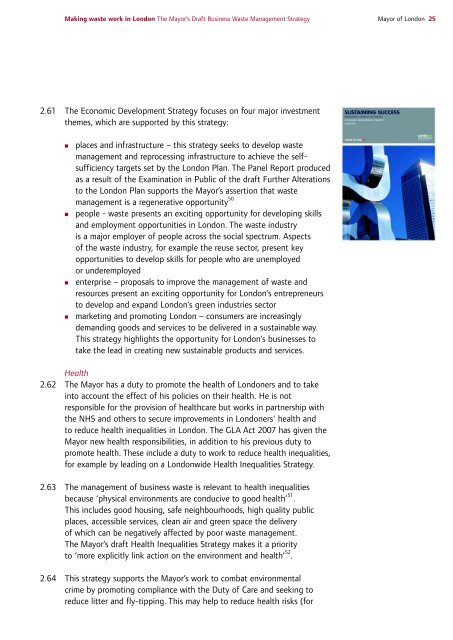Draft Business Waste Strategy PDF - london.gov.uk - Greater ...
Draft Business Waste Strategy PDF - london.gov.uk - Greater ...
Draft Business Waste Strategy PDF - london.gov.uk - Greater ...
Create successful ePaper yourself
Turn your PDF publications into a flip-book with our unique Google optimized e-Paper software.
Making waste work in London The Mayor’s <strong>Draft</strong> <strong>Business</strong> <strong>Waste</strong> Management <strong>Strategy</strong> Mayor of London 25<br />
2.61 The Economic Development <strong>Strategy</strong> focuses on four major investment<br />
themes, which are supported by this strategy:<br />
■ places and infrastructure – this strategy seeks to develop waste<br />
management and reprocessing infrastructure to achieve the selfsufficiency<br />
targets set by the London Plan. The Panel Report produced<br />
as a result of the Examination in Public of the draft Further Alterations<br />
to the London Plan supports the Mayor’s assertion that waste<br />
management is a regenerative opportunity 50<br />
■ people - waste presents an exciting opportunity for developing skills<br />
and employment opportunities in London. The waste industry<br />
is a major employer of people across the social spectrum. Aspects<br />
of the waste industry, for example the reuse sector, present key<br />
opportunities to develop skills for people who are unemployed<br />
or underemployed<br />
■ enterprise – proposals to improve the management of waste and<br />
resources present an exciting opportunity for London’s entrepreneurs<br />
to develop and expand London’s green industries sector<br />
■ marketing and promoting London – consumers are increasingly<br />
demanding goods and services to be delivered in a sustainable way.<br />
This strategy highlights the opportunity for London’s businesses to<br />
take the lead in creating new sustainable products and services.<br />
Health<br />
2.62 The Mayor has a duty to promote the health of Londoners and to take<br />
into account the effect of his policies on their health. He is not<br />
responsible for the provision of healthcare but works in partnership with<br />
the NHS and others to secure improvements in Londoners' health and<br />
to reduce health inequalities in London. The GLA Act 2007 has given the<br />
Mayor new health responsibilities, in addition to his previous duty to<br />
promote health. These include a duty to work to reduce health inequalities,<br />
for example by leading on a Londonwide Health Inequalities <strong>Strategy</strong>.<br />
2.63 The management of business waste is relevant to health inequalities<br />
because ‘physical environments are conducive to good health’ 51 .<br />
This includes good housing, safe neighbourhoods, high quality public<br />
places, accessible services, clean air and green space the delivery<br />
of which can be negatively affected by poor waste management.<br />
The Mayor’s draft Health Inequalities <strong>Strategy</strong> makes it a priority<br />
to ‘more explicitly link action on the environment and health’ 52 .<br />
2.64 This strategy supports the Mayor’s work to combat environmental<br />
crime by promoting compliance with the Duty of Care and seeking to<br />
reduce litter and fly-tipping. This may help to reduce health risks (for
















